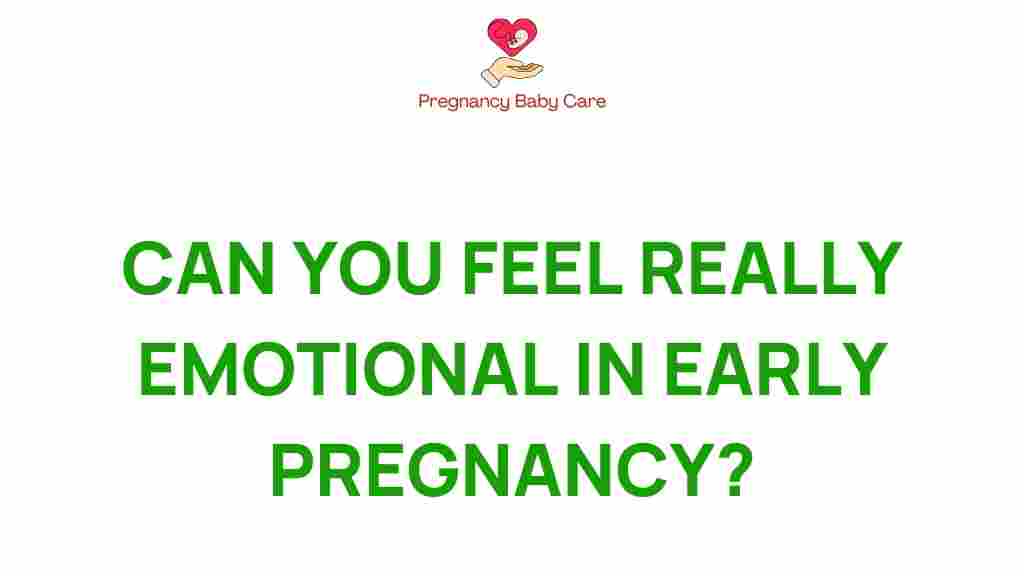The Surprising Emotions of Early Pregnancy
Embarking on the journey of early pregnancy can be an exhilarating yet overwhelming experience. While many expectant parents focus on the physical changes associated with pregnancy symptoms, it’s equally important to understand the emotional changes that accompany this transformative time. In this article, we will explore the various emotional shifts, mood swings, and the overall impact on mental health during the first trimester of pregnancy.
Understanding Emotional Changes in Early Pregnancy
During early pregnancy, hormonal shifts can lead to a wide range of emotional changes. These fluctuations are a normal part of the pregnancy journey, but they can sometimes feel unpredictable and intense. Here are some key emotions you might experience:
- Joy and Excitement: The news of a pregnancy can bring immense joy and excitement, especially if it was planned or anticipated.
- Fear and Anxiety: Concerns about the baby’s health, the labor process, and parenting can create anxiety.
- Overwhelm: The reality of impending parenthood can feel overwhelming, leading to feelings of stress.
- Sadness and Mood Swings: Hormonal changes can also trigger mood swings, causing feelings of sadness or irritability.
The Role of Hormonal Shifts
During the first trimester, your body undergoes significant hormonal changes that can greatly influence your emotional well-being. The primary hormones involved include:
- Human Chorionic Gonadotropin (hCG): Levels of hCG rise sharply during early pregnancy, which can affect mood.
- Progesterone: This hormone helps maintain the pregnancy but can also cause fatigue and emotional fluctuations.
- Estrogen: Increases in estrogen can enhance mood but may also lead to mood swings.
These hormonal shifts can lead to emotional highs and lows, making it essential to navigate these changes with care.
Common Pregnancy Symptoms Affecting Emotions
Aside from hormonal changes, various physical symptoms experienced during early pregnancy can also impact your emotional state. Common pregnancy symptoms include:
- Nausea and Vomiting: Often referred to as “morning sickness,” these symptoms can leave you feeling drained and irritable.
- Fatigue: Extreme tiredness can contribute to mood swings and feelings of sadness.
- Breast Tenderness: Physical discomfort can influence your mood and emotional responses.
- Frequent Urination: This can disrupt your sleep and lead to increased fatigue and irritability.
Understanding how these symptoms contribute to emotional changes can help you better prepare for the ups and downs of early pregnancy.
Tips for Managing Emotional Changes
While emotional changes are a natural part of early pregnancy, there are several strategies you can employ to support your mental health and emotional well-being:
- Stay Informed: Educate yourself about what to expect during pregnancy. Knowledge can reduce anxiety and help you feel more prepared.
- Communicate: Share your feelings with your partner, friends, or family. Talking about your emotions can provide support and understanding.
- Practice Self-Care: Engage in activities that promote relaxation, such as yoga, meditation, or gentle exercise.
- Seek Professional Help: If feelings of anxiety or sadness become overwhelming, consider talking to a mental health professional who specializes in pregnancy-related issues.
To effectively manage emotional changes and enhance your emotional well-being during early pregnancy, consider following this step-by-step process:
Step 1: Acknowledge Your Feelings
Recognize that a wide range of emotions is normal during early pregnancy. Allow yourself to feel and express these emotions without judgment.
Step 2: Keep a Journal
Writing down your thoughts and feelings can help you process your emotions. It can also serve as a record of your pregnancy journey.
Step 3: Create a Support Network
Surround yourself with supportive friends and family who understand the emotional ups and downs of pregnancy. Consider joining a pregnancy group or forum.
Step 4: Establish Healthy Routines
Incorporate healthy eating, regular exercise, and adequate sleep into your daily routine to support both your physical and emotional health.
Step 5: Practice Mindfulness
Engage in mindfulness practices such as meditation or deep breathing exercises to help manage stress and promote emotional balance.
Troubleshooting Common Emotional Challenges
Even with the best strategies in place, you may encounter specific emotional challenges during early pregnancy. Here are some common issues and how to address them:
Challenge: Intense Mood Swings
If you find yourself experiencing extreme mood swings, remember that this is often due to hormonal changes. Consider the following:
- Take deep breaths and allow yourself to feel your emotions.
- Engage in calming activities, such as a warm bath or listening to soothing music.
Challenge: Persistent Anxiety
If anxiety becomes overwhelming, try these approaches:
- Practice grounding techniques, such as focusing on your breath or your surroundings.
- Limit exposure to negative news or stressful situations.
- Reach out for professional support if needed.
Challenge: Feelings of Isolation
It’s common to feel isolated during early pregnancy, especially if friends or family members are not experiencing pregnancy at the same time. To combat this:
- Connect with online communities or local support groups for expectant parents.
- Schedule regular check-ins with friends and family to maintain social connections.
Conclusion: Embracing the Emotional Journey of Early Pregnancy
Early pregnancy is a unique and transformative journey filled with a spectrum of emotions. By understanding the emotional changes, managing mood swings, and addressing mental health concerns, you can foster emotional well-being during this exciting time. Remember, it’s important to be gentle with yourself and seek support when needed. Embrace this journey, and know that you are not alone in experiencing these emotions. For further reading on managing mental health during pregnancy, consider visiting this resource for more information.
As you navigate the first trimester of your pregnancy, remember to celebrate the small joys and milestones along the way. Every experience contributes to the beautiful journey of bringing new life into the world.
For more tips on emotional well-being during pregnancy, check out our other articles here.
This article is in the category Pregnancy and created by PregnancyBabyCare Team
